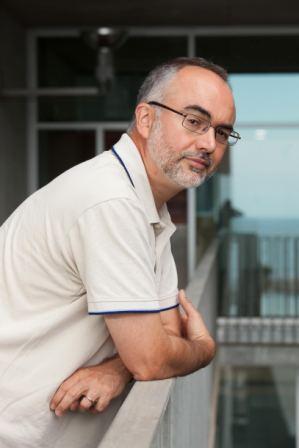INTERVIEW with Arcadi Navarro: "It's thrilling that goodwill can make achievements like establishing the EGA in Barcelona possible"
INTERVIEW with Arcadi Navarro: "It's thrilling that goodwill can make achievements like establishing the EGA in Barcelona possible"
INTERVIEW with Arcadi Navarro: "It's thrilling that goodwill can make achievements like establishing the EGA in Barcelona possible"
 Arcadi Navarro Cuartiellas is an ICREA (Catalan Institution for Research and Advanced Studies) research professor, director of the Evolutionary Genomics Research Group at the Institute of Evolutionary Biology (established by the Spanish National Research Council and UPF), and a team leader at the Centre for Genomic Regulation (CRG). He has been in charge of the European Genome-phenome Archive (EGA) project in Barcelona since 2013.
Arcadi Navarro Cuartiellas is an ICREA (Catalan Institution for Research and Advanced Studies) research professor, director of the Evolutionary Genomics Research Group at the Institute of Evolutionary Biology (established by the Spanish National Research Council and UPF), and a team leader at the Centre for Genomic Regulation (CRG). He has been in charge of the European Genome-phenome Archive (EGA) project in Barcelona since 2013.
What's the EGA?
It's a large archive of human genome data, mostly related to diseases. It was created by the European Bioinformatics Institute, or EBI, which operates from Hinxton in the UK. The archive contains the results of over 800 studies, giving it a volume of close to a million gigabytes and rising. It now has a centre in Barcelona, which is run by the CRG and provided with computing capacity by the Barcelona Supercomputing Centre, or BSC. The EBI and a team that I direct manage the archive jointly.
As a researcher, what does directing the project entail?
Dividing myself into lots of little pieces, learning amazing things and working with a fantastic team. First and foremost though, it entails the satisfaction of contributing to the genomics and Big Data revolution. Secondly, it means being able to ask numerous questions that we simply couldn't have contemplated asking just a short while ago. The data stored in the EGA makes it possible to carry out massive, comprehensive studies. We can expect, for example, to establish some surprising links between diseases.
"The archive contains the results of over 800 studies, giving it a volume of close to a million gigabytes and rising" What scientific results can we expect from the EGA?
200 data providers around the world, data from 100,000 people, a million gigabytes of information... We're talking about a big project.
Regardless of how large the numbers involved at present might seem, it's clear that this is only the beginning. The EGA is growing all the time. In a couple of years, it's current content will look like next to nothing.
Could it be said that it's a good example of cooperation in the research arena?
Absolutely! It's a project conceived both on the basis of and for collaboration. The scientists who generate the data make it available to the community so that other research groups can analyse it and publish their findings. Additionally, the project itself and the process of establishing it in Barcelona constitute a clear example of how different research centres and universities can work together with a common goal. It's thrilling that cooperation and goodwill can make achievements like this possible at a time of severe financial constraints. So, the city of Barcelona has become a reference point for science.
"Barcelona has been a reference point for science for some time, especially in the case of genomics"
Why was it chosen?
Actually, Barcelona has been a reference point for science for some time, especially in the case of genomics. Being entrusted with the joint management of the EGA merely confirms that. Barcelona boasts highly dynamic biomedical research, cutting-edge genome research centres, and the great experience and capacity of the BSC, all in a relatively small space. It's a rare combination.
What role is UPF playing in the project?
UPF's input consists of its extenive experience in genomics, databases and its teaching staff's willingness to serve the public.
"In Spain, research is three things: an anomaly, an example and a weakness"
More generally, what's the situation with regard to research in Spain?
In Spain, research is three things: an anomaly, an example and a weakness. It's an anomaly in a positive sense because it's extraordinarily good, despite
the current economic situation and the government's deplorable science policy. It's an example because there are few things that work as well as research, and that goes for Catalonia too. Maybe lessons could be learned as to how to improve other spheres in the country, from primary education to forestry and the police, by looking at how research has been improved over the last 20 years. In my view, by the way, the fact that governments of different political persuasions have shared objectives has been crucial. That generates very necessary stability.
Lastly, I know it might seem paradoxical to say that research in Spain is a weakness, but I'm talking about the fragility of an anomalous system that's highly dependent on the state. The higher you fly, the farther you can fall. The shortage of funding and Madrid's bureaucratic hounding of researchers are negative forces that could bring the system down.
"Cooperating, working together and making all our knowledge available, as households have traditionally done, we'll overcome the difficulties we're facing"
What about UPF? What's the situation here?
As a key part - an outstanding part even - of the system, UPF shares its characteristics and weaknesses. Maybe following the EGA's example, i.e. cooperating, working together and making all our knowledge available, as households have traditionally done, we'll overcome the difficulties we're facing. It won't be easy though.
